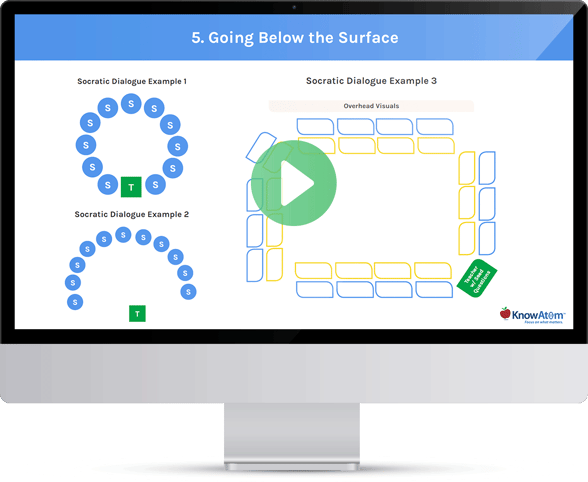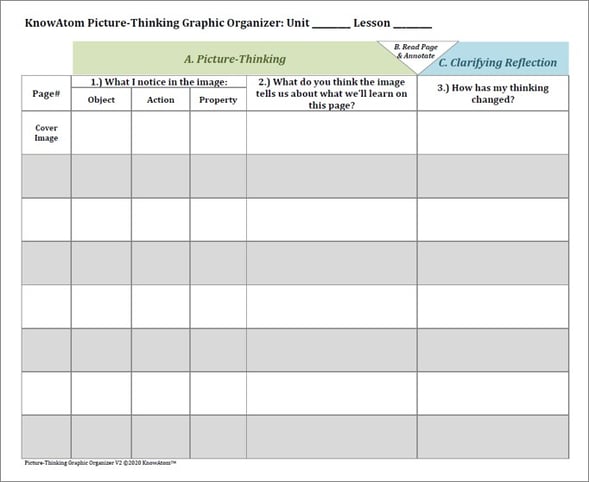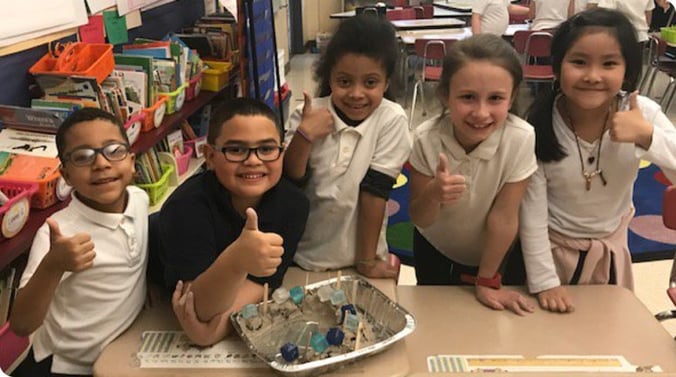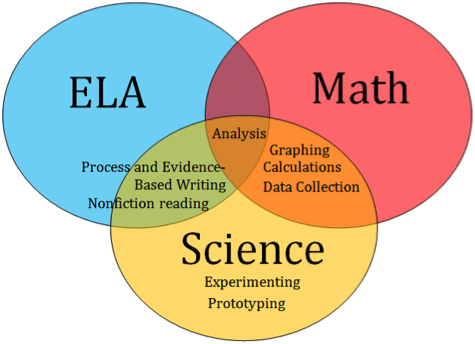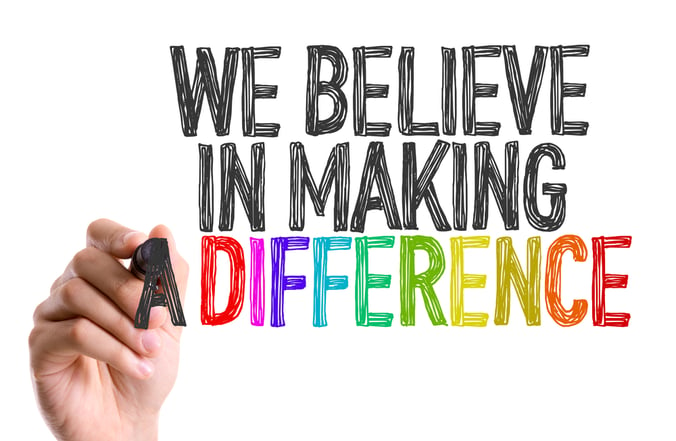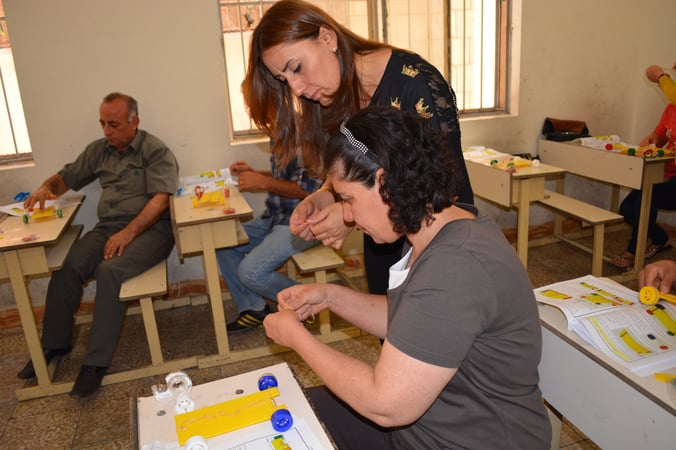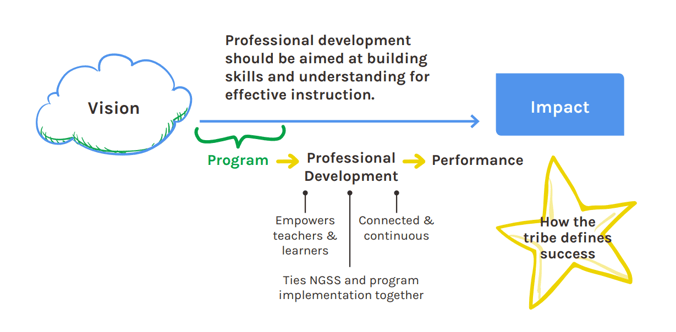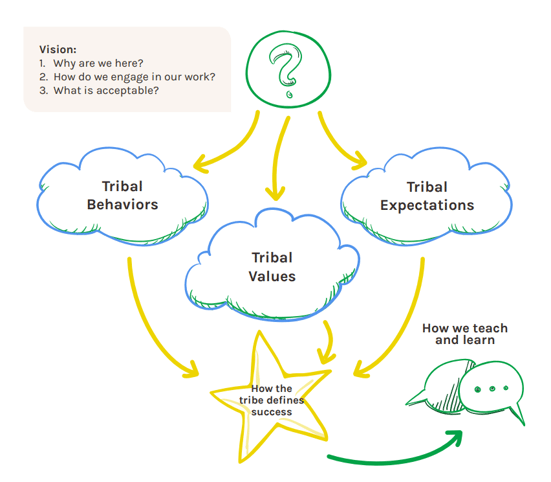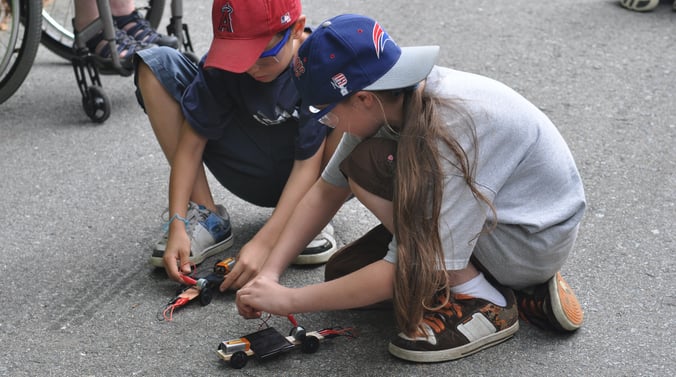As school leaders become more focused on successfully implementing the Next Generation Science Standards, I’ve noticed one topic is getting more attention than ever before: how important it is that principals understand the new standards and the expectations of a next-generation science classroom.
Continue readingThe second step in the KnowAtom lesson routine for grades K-8 is Socratic dialogue. This is an important part of the Next Generation Science Standards (NGSS)-based curriculum for students of all ages. If you're new at implementing scientific discussions or looking to improve the Socratic dialogue in your classroom, it's important to set clear expectations for yourself and your students. Knowing what you should expect as a teacher-facilitator and what you should expect from your students as they become more familiar with Socratic dialogue in your science class, will help improve your results.
Continue readingTopics: Next Generation Science Standards, Socratic dialogue, Implementing New Science Standards
One thing I've learned over the past 20 years of teaching is that learning styles are really more about teaching styles. There are many different types of learning styles and it's important to make sure that we are teaching all learners and giving students the tools they need to succeed in the classroom. One example of how to accomplish this challenge in your own classroom is by improving access to the assigned reading for all students. To help, I am going to share the tools and strategies I use to engage all students in the nonfiction reading component of the KnowAtom science curriculum.
KnowAtom's next generation science standards (NGSS)-designed curriculum uses a similar routine for each lesson so that students begin to know what to expect. For each lesson within every unit, we start out reading. Students then take part in a Socratic dialogue using what they've learned from the reading. Next, we plan for a hands-on experiment, investigation, or engineering prototype. To wrap up the investigation, teams share their conclusions and debrief. As you can see, the nonfiction reading provides the launching point for each lesson.
No matter what level a student is reading at, whether they are an English language learner or whether they are predominantly a visual vs. an auditory learner, it's important that they can access the information in the reader upfront. To help students with different types of learning styles access the nonfiction text, teachers must understand how students learn differently. One popular model is the VARK learning styles theory. VARK identifies four different learning styles: visual, auditory, kinesthetic, and reading/writing. While most students have a combination of these different types of learning styles, some students learn predominantly from only one.
Connecting new phenomena to past experience
When beginning a new lesson, teachers should consider what knowledge and experiences students bring with them to the class. By establishing a common background when introducing new phenomena, teachers help level the playing field for students who are at different places along their learning journey.
For example, if we're investigating friction and the impact that a dog sled might have moving over snow, that context would be really difficult for a student who hasn't experienced snow to think about. "I don't understand because I don't know what it's like to walk on snow. I don't know the properties of snow. I haven't experienced that," the student is thinking. With the KnowAtom curriculum, the text before every unit helps give every student a common background and some insight into the phenomena they're about to explore.
For students with reading/writing predominance in their VARK learning style, reading the text before the hands-on experiment helps them understand the new concept when it is introduced. But that's not the only type of learning style you have in your classroom. Visual learners are better supported by the visuals in the nonfiction reader, including photos, charts, and graphs with explanatory text. Auditory learners may learn best from classroom discussions about the reading and can be supported by tools like sentence starter frames and annotating the text, so they come to the class discussion with the right questions to ask. Finally, kinesthetic learners learn from doing – and the tactile experience of completing an engineering project related to the new concept will help them better understand the lesson.
Another way students with all different types of learning styles can relate to the nonfiction text in the KnowAtom student readers is by connecting the new information to current knowledge – what they've learned before. Students start to think about, "Oh, I remember learning a little bit about that last year," or "I experienced something like this when I was cooking at home and the water started to boil." When working in pairs, small groups, or as a class – teachers can help students connect new phenomena with current knowledge by asking questions about what they've learned from the text and what it reminds them of.
KnowAtom's introductory text helps students start to think about what they will be exploring in the hands-on activity. It introduces or reinforces the vocabulary needed for the Socratic discourse, so students feel more comfortable joining in the classroom discussion. When using KnowAtom's NGSS-designed curriculum, we challenge our students to act like scientists and engineers, interacting with their peers in a professional setting. This helps level the playing field even further because all students are accessing the same vocabulary when discussing the new phenomenon and understand the rules of engagement when taking part in the classroom discussion.
Tools to strengthen reading fundamentals for all types of learning styles
One of the first things I do to help improve access to the reading material for all students is using prereading tools. The majority of my students are English learners, so they are often not reading at grade level yet. One tool I use to help them access the text is focusing on pictures. Asking students to find meaning in the images in KnowAtom's student readers and using a picture thinking graphic organizer helps them identify the images' object, action, and property. Students build critical thinking and active reading skills as they wonder what they will be reading about through the images and connect it to their current knowledge. This can be done together as a class, or in small student groups, or individually.
Topics: Next Generation Science Standards, higher order thinking, Socratic dialogue, STEM / STEAM, Middle School Science Curriculum, Next Generation Science, Implementing New Science Standards, NGSS-Designed Curriculum, Phenomena-Based Learning, Remote Learning, Thinking Routines
As a science teacher for over 20 years, I’ve seen a lot of teaching strategies come and go. Today, the focus is on Next Generation Science Standards (NGSS) to help prepare students to join the workforce of the future. The teaching methods required by NGSS are based on constructivism – the idea that learners actively create new knowledge and understanding based on what they already know. Concept mapping is one way to help students link new ideas to knowledge they already have.
Continue readingTopics: Next Generation Science Standards, STEAM, interactive science, Professional Development, Inquiry Based Learning, STEAM Curriculum, Next Generation Science, Implementing New Science Standards, NGSS-Designed Curriculum, Next Generation Science Classroom Instruction, Phenomena-Based Learning, science education, Remote Learning, Formative Assessment
KnowAtom’s interactive science curriculum is designed to help students strengthen teamwork, collaboration and group communication skills through authentic instruction, hands-on lab work, and student-centered STEM investigations. As a result, teachers who use the Next Generation Science Standards (NGSS)-based curriculum report improved collaboration among their students, as they work together in teams to investigate, question, and explain core theories. One researcher from Northeastern University, Dr. Tracy L. Waters, evaluated KnowAtom implementation in fourth and fifth grade science classrooms and identified diverse examples of increased collaboration amongst students throughout the year.
Continue readingTopics: Next Generation Science Standards, higher order thinking, Professional Development, Implementing New Science Standards, Time on Learning
Research from Northeastern University’s Dr. Tracy L. Waters shows that using the KnowAtom Next Generation Science Standards (NGSS)-based curriculum is helping teachers spark excitement from young learners. Promoting differentiation in how students are taught core science concepts, build 21st century career skills, and utilize scientific process for hands-on discovery is helping improve student success and increase collaboration and engagement in the classroom.
Continue readingTopics: Middle School Science Curriculum, 5E Instructional Model, Next Generation Science, Implementing New Science Standards, NGSS-Designed Curriculum, Next Generation Science Classroom Instruction
In 2015, the National Research Council released it’s landmark Guide to Implementing the Next Generation Science Standards. The framework for K-12 Science Education and Next Generation Science Standards (NGSS) was a vision for how to teach hands-on science processes and practices to build the skills needed for the workforce of the future. Since then, NGSS have been adopted by at least forty-five states and the District of Columbia, impacting the vast majority of the U.S. school aged population, according to Northeastern University researcher Dr. Tracy L. Waters.
Continue readingTopics: Professional Development, Implementing New Science Standards
New research from Northeastern University researcher Dr. Tracy L. Waters identifies the changes middle and elementary school teachers made to their instructional practices when implementing KnowAtom’s Next Generation Science Standard (NGSS)-based curriculum. She describes the KnowAtom curriculum as “built on an innovative approach to teaching science based on the NGSS, where teachers become facilitators of learning rather than givers of information.” Her research shows just how much “teaching practice was transformed through curriculum implementation when teachers began to release responsibility to students…”.
Continue readingTopics: Next Generation Science Standards, Policy, Professional Development, Implementing New Science Standards, Next Generation Leadership
Connecting students with phenomena-based science, technology, engineering, and math (STEM) learning opportunities is a driving force behind building the workforce of the future. For school leaders and teachers just starting to implement new hands-on learning models and those who have been incorporating collaborate STEM education for years, understanding the measurable effect on student learning and engagement levels is important. One Northeastern University researcher set out to evaluate the impact of implementing the collaborative, hands-on KnowAtom science curriculum in elementary and middle school classrooms.
Topics: Professional Development, Implementing New Science Standards, NGSS-Designed Curriculum, Case Studies, NGSS-Aligned Curriculum
As new science curricula appear in the market claiming to be designed for the Next Generation Science Standards, more and more teachers are starting to ask what their purpose is in a next generation classroom.
Continue readingTopics: Next Generation Science Standards, Next Generation Science, Implementing New Science Standards, NGSS-Designed Curriculum, Next Generation Science Classroom Instruction, STEM Education Policy, Three-Dimensional Learning
Now that the majority of states (40, to be specific, plus the District of Columbia) have adopted either the Next Generation Science Standards or very similar science standards, there is a growing focus on how to create assessments that are aligned to the new standards.
The Next Generation Science Standards were developed based on recommendations from the National Research Council’s A Framework for K-12 Science Education.
“Fully meeting the vision set forth by the Framework and Framework-aligned standards requires high-quality and aligned assessments that can provide actionable information to students, teachers, and families,” according to a recent report by the nonprofit Achieve.
Continue readingTopics: Next Generation Science Standards, Implementing New Science Standards, STEM Education Policy, Formative Assessment, Three-Dimensional Learning
In our third post exploring how to develop a culture of success with the Next Generation Science Standards, we turn our attention to the role of professional development .
It is essential to have a professional development plan that positively shapes culture. This is because if you’re going to do something new, then you need to understand what’s involved in that new thing. This is true for any task, including implementing the Next Generation Science Standards.
Teachers teach the students. But who teaches the teachers and the administrators? That’s key because
if you buy a program that you don’t understand, or somebody buys a program for you that you don’t understand, then how can you implement the program as it’s designed to be used?
Continue readingTopics: Next Generation Science Standards, Professional Development, Implementing New Science Standards, Next Generation Leadership, Three-Dimensional Learning
Fully implementing the Next Generation Science Standards is a growth process. Once you actually have a program that is thoughtful and well developed, it will take three to five years to get to a fully successful and effective implementation.
A quote that resonates when thinking about teaching and learning with the Next Generation Science Standards comes from Angela Duckworth in her book Grit: “Novelty for the beginner comes in one form and novelty for the expert in another. For the beginner, novelty is anything that hasn’t been encountered before. For the expert, novelty is a nuance.”
Continue readingTopics: School Climate and Culture, Implementing New Science Standards, Next Generation Leadership, Next Generation Science Classroom Instruction, STEM Education Policy, Three-Dimensional Learning
“Culture eats strategy – and programs—for breakfast.”
This quote is KnowAtom’s take on the quip attributed to management guru Peter Drucker, “Culture eats strategy for breakfast,” which emphasizes the critical role that an organization’s culture—even more than any strategy it might develop—plays in that organization’s success.
We're modifying it to say that culture eats both strategy and programs for breakfast.
This saying is relevant for districts and classrooms implementing the Next Generation Science Standards because people often focus on programs and/or strategies for the new standards, but fail to consider a balance of both to address the
cultural shifts needed to ensure a smooth and successful implementation.
So what is culture?
Topics: Next Generation Science Standards, Implementing New Science Standards, Next Generation Leadership, Next Generation Science Classroom Instruction, Three-Dimensional Learning
Innovative companies like iRobot face many of the same challenges as teachers and school districts that are adopting and beginning to implement the Next Generation Science Standards.
Continue readingTopics: Next Generation Science Standards, Guest Innovator, Innovation, Implementing New Science Standards, Three-Dimensional Learning



